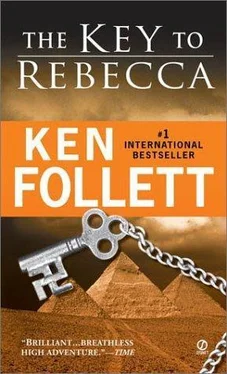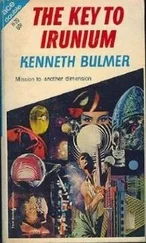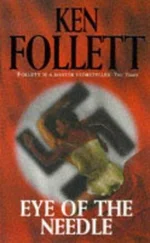Ken Follett - The Key to Rebecca
Здесь есть возможность читать онлайн «Ken Follett - The Key to Rebecca» весь текст электронной книги совершенно бесплатно (целиком полную версию без сокращений). В некоторых случаях можно слушать аудио, скачать через торрент в формате fb2 и присутствует краткое содержание. Жанр: Шпионский детектив, на английском языке. Описание произведения, (предисловие) а так же отзывы посетителей доступны на портале библиотеки ЛибКат.
- Название:The Key to Rebecca
- Автор:
- Жанр:
- Год:неизвестен
- ISBN:нет данных
- Рейтинг книги:4 / 5. Голосов: 1
-
Избранное:Добавить в избранное
- Отзывы:
-
Ваша оценка:
- 80
- 1
- 2
- 3
- 4
- 5
The Key to Rebecca: краткое содержание, описание и аннотация
Предлагаем к чтению аннотацию, описание, краткое содержание или предисловие (зависит от того, что написал сам автор книги «The Key to Rebecca»). Если вы не нашли необходимую информацию о книге — напишите в комментариях, мы постараемся отыскать её.
The Key to Rebecca — читать онлайн бесплатно полную книгу (весь текст) целиком
Ниже представлен текст книги, разбитый по страницам. Система сохранения места последней прочитанной страницы, позволяет с удобством читать онлайн бесплатно книгу «The Key to Rebecca», без необходимости каждый раз заново искать на чём Вы остановились. Поставьте закладку, и сможете в любой момент перейти на страницу, на которой закончили чтение.
Интервал:
Закладка:
The jeep had stopped outside Vandam’s house. He got out. “I want you to wait for me,” he told the driver. “You’d better come in.” He led the way into the house, then directed the driver to the kitchen. “My servant, Gaafar, will give you something to eat, so long as you don’t treat him like a wog.”
“Thank you very much, sir,” said the driver.
There was a small stack of mail on the hall table. The top envelope had no stamp, and was addressed to Vandam in a vaguely familiar hand. It had “Urgent” scribbled in the top left-hand comer. Vandam picked it up.
There was more he should do, he realized. Wolff could well be heading south now. Roadblocks should be set up at all major towns on the route. There should be someone at every stop on the railway line, looking for Wolff. And the river itself... There had to be some way of checking the river, in case Wolff really had gone by boat, as in the daydream. Vandam was finding it hard to concentrate. We could set up riverblocks on the same principle as roadblocks, he thought; why not? None of it would be any good if Wolff had simply gone to ground in Cairo. Suppose he were hiding in the cemeteries? Many Muslims buried their dead in tiny houses, and there were acres of such empty buildings in the city: Vandam would have needed a thousand men to search them all. Perhaps I should do it anyway, he thought. But Wolff might have gone north, toward Alexandria; or east or west into the desert ...
He went into the drawing room, looking for a letter opener. Somehow the search had to be narrowed down. Vandam did not have thousands of men at his disposal—they were all in the desert, fighting. He had to decide what was the best bet. He remembered where all this had started: Assyut. Perhaps he should contact Captain Newman in Assyut. That seemed to be where Wolff had come in from the desert, so maybe he would go out that way. Maybe his cousins were in that vicinity. Vandam looked indecisively at the telephone. Where was that damned letter opener? He went to the door and called: “Gaafar!” He came back into the room, and saw Billy’s school atlas on a chair. It looked mucky. The boy had dropped it in a puddle, or something. He picked it up. It was sticky. Vandam realized there was blood on it. He felt as if he were in a nightmare. What was going on? No letter opener, blood on the atlas, nomads at Assyut ...
Gaafar came in. Vandam said: “What’s this mess?”
Gaafar looked. “I’m sorry, sir, I don’t know. They were looking at it while Captain Alexander was here—”
“Who’s they? Who’s Captain Alexander?”
“The officer you sent to take Billy to school, sir. His name was—”
“Stop.” A terrible fear cleared Vandam’s brain in an instant. “A British Army captain came here this morning and took Billy away?”
“Yes, sir, he took him to school. He said you sent him—”
“Gaafar, I sent nobody.”
The servant’s brown face turned gray.
Vandam said: “Didn’t you check that he was genuine?”
“But, sir, Miss Fontana was with him, so it seemed all right.”
“Oh, my God.” Vandam looked at the envelope in his hand. Now he knew why the handwriting was familiar: it was the same as that on the note that Wolff had sent to Elene. He ripped open the envelope. Inside was a message in the same hand:
Dear Major Vandam,
Billy is with me. Elene is taking care of him. He will be quite all right as long as I am safe. I advise you to stay where you are and do nothing. We do not make war on children, and I have no wish to harm the boy. All the same, the life of one child is as nothing beside the future of my two nations, Egypt and Germany; so be assured that if it suits my purpose I will kill Billy.
Yours truly,
Alex Wolff
It was a letter from a madman: the polite salutations, the correct English, the semicolon, the attempt to justify the kidnapping of an innocent child ... Now Vandam knew that, somewhere deep down inside, Wolff was insane.
And he had Billy.
Vandam handed the note to Gaafar, who put on his spectacles with a shaky hand. Wolff had taken Elene with him when he left the houseboat. It would not have been difficult to coerce her into helping him: all he had to do was threaten Billy, and she would have been helpless. But what was the point of the kidnap, really? And where had they gone? And why the blood?
Gaafar was weeping openly. Vandam said: “Who was hurt? Who was bleeding?”
“There was no violence,” Gaafar said. “I think Miss Fontana had cut her hand.”
And she had smeared blood on Billy’s atlas and left it on the chair. It was a sign, a message of some kind. Vandam held the book in his hands and let it fall open. Immediately he saw the map of Egypt with a blotted red arrow roughly drawn. It pointed to Assyut.
Vandam picked up the phone and dialed GHQ. When the switchboard answered he hung up. He thought: If I report this, what will happen? Bogge will order a squad of light infantry to arrest Wolff at Assyut. There will be a fight. Wolff will know he has lost, know he is to be shot for spying, not to mention kidnapping and murder—and what will he do then?
He is insane, Vandam thought; he will kill my son.
He felt paralyzed by fear. Of course that was what Wolff wanted, that was his aim in taking Billy, to paralyze Vandam. That was how kidnapping worked.
If Vandam brought the Army in, there would be a shoot-out. Wolff might kill Billy out of mad spite. So there was only one option.
Vandam had to go after them alone.
“Get me two bottles of water,” he told Gaafar. The servant went off. Vandam went into the hall and put on his motorcycle goggles, then found a scarf and wound it around his mouth and neck. Gaafar came from the kitchen with the bottles of water. Vandam left the house and went to his motorcycle. He put the bottles in the pannier and climbed on the bike. He kicked it into life and revved the engine. The fuel tank was full. Gaafar stood beside him, still weeping. Vandam touched the old man’s shoulder. “I’ll bring them back,” he said. He rocked the bike off its stand, drove into the street and turned south.
26
MY GOD, THE STATION WAS A SHAMBLES. I SUPPOSE EVERYONE WANTS TO GET out of Cairo in case it gets bombed. No first-class seats on the trains to Palestine—not even standing room. The wives and children of the British are running like rats. Fortunately southbound trains are less in demand. The booking office still claimed there were no seats, but they always say that; a few piasters here and a few more there always gets a seat, or three. I was afraid I might lose Elene and the boy on the platform, among all the hundreds of peasants, barefoot in their dirty galabiyas, carrying boxes tied with string, chickens in crates, sitting on the platform eating their breakfast, a fat mother in black handing out boiled eggs and pita bread and caked rice to her husband and sons, cousins and daughters and in-laws; smart idea of mine, to hold the boy’s hand—if I keep him close by, Elene will follow; smart idea, I have smart ideas, Christ I’m smart, smarter than Vandam, eat your heart out, Major Vandam, I’ve got your son. Somebody had a goat on a lead. Fancy taking a goat on a train ride. I never had to travel economy with the peasants and their goats. What a job, to clean the economy coach at the end of the journey, I wonder who does it, some poor fellah, a different breed, a different race, born slaves, thank God we got first-class seats, I travel first class through life, I hate dirt, God that station was dirty. Vendors on the platform: cigarettes, newspapers, a man with a huge basket of bread on his head. I like the women when they carry baskets on their heads, looking so graceful and proud, makes you want to do it to them there and then, standing up, I like women when they like to do it, when they lose their minds with pleasure, when they scream, Gesundheit! Look at Elene, sitting there beside the boy, so frightened, so beautiful, I want to do it with her again soon, forget Sonja, I’d like to do it with Elene right now, here on the train, in front of all these people, humiliate her, with Vandam’s son watching, terrified, ha! Look at the mud-brick suburbs, houses leaning against one another for support, cows and sheep in the narrow dusty streets, I always wondered what they ate, those city sheep with their fat tails, where do they graze? No plumbing in those dark little houses beside the railway line. Women in the doorways peeling vegetables, sitting cross-legged on the dusty ground. Cats. So graceful, the cats. European cats are different, slower and much fatter; no wonder cats are sacred here, they are so beautiful, a kitten brings luck. The English like dogs. Disgusting animals, dogs: unclean, undignified, slobbering, fawning, sniffing. A cat is superior, and knows it. It is so important to be superior. One is a master or a slave. I hold my head up, like a cat; I walk about, ignoring the hoi polloi, intent on my own mysterious tasks, using people the way a cat uses its owner, giving no thanks and accepting no affection, taking what they offer as a right, not a gift. I’m a master, a German Nazi, an Egyptian Bedouin, a born ruler. How many hours to Assyut, eight, ten? Must move fast. Find Ishmael. He should be at the well, or not far away. Pick up the radio. Broadcast at midnight tonight. Complete British defense, what a coup, they’ll give me medals. Germans in charge in Cairo. Oh, boy, we’ll get the place into shape. What a combination, Germans and Egyptians, efficiency by day and sensuality by night, Teutonic technology and Bedouin savagery, Beethoven and hashish. If I can survive, make it to Assyut, contact Rommel; then Rommel can cross the last bridge, destroy the last line of defense, dash to Cairo, annihilate the British, what a victory that will be. If I can make it. What a triumph! What a triumph! What a triumph!
Читать дальшеИнтервал:
Закладка:
Похожие книги на «The Key to Rebecca»
Представляем Вашему вниманию похожие книги на «The Key to Rebecca» списком для выбора. Мы отобрали схожую по названию и смыслу литературу в надежде предоставить читателям больше вариантов отыскать новые, интересные, ещё непрочитанные произведения.
Обсуждение, отзывы о книге «The Key to Rebecca» и просто собственные мнения читателей. Оставьте ваши комментарии, напишите, что Вы думаете о произведении, его смысле или главных героях. Укажите что конкретно понравилось, а что нет, и почему Вы так считаете.












